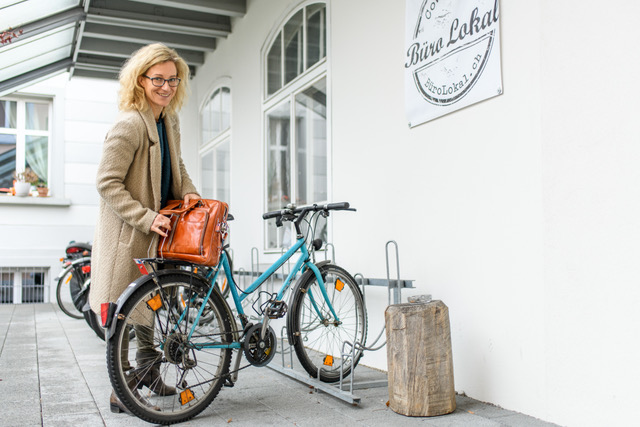Working from satellite offices can help employers, employees and the world in general in many ways. We have interviewed Jenny Schäpper-Uster, co-founder at VillageOffice in Switzerland, to find out more about her story, the principals behind the platform and the vision and mission it represents.
Hi Jenny. Can you introduce us to VillageOffice?

Jenny Schäpper-Uster
VillageOffice was founded in early 2016 with the intention to help catalyze the development and expansion of coworking offerings outside of the cities (i.e in the suburbs and rural regions of the country).
In theory, the greater the offering of “community based coworking spaces” in the periphery, the less the workers have to commute. This reduces transport needs to the already over-populated city centres (and thus also CO2). It saves everyone, employers and employees, time and money on a daily basis. It also saves millions (if not billions) of investments in capacity extension of today’s roads and railways. Additionally, people will be back working close to where they live. It will re-boot the local economy. The available time can be reinvested in family, local community work, politics, sports and free-time in general.
Today our main focus is coaching municipalities and local citizens on their way to establishing locally embedded coworking spaces. To drive the visibility and accessibility to our partner coworking spaces around the country, we offer coworkers (corporates or individuals) an national membership which is valid in all of our partner spaces – 60 to date.
Our digitally remote, self-organized and holacracy-based cooperative has grown to a team of 24 (7 core and 17 extended) and looks forward to many fascinating, agile years to come.
People will be back working close to where they live. It will re-boot the local economy. The available time can be reinvested in family, local community work, politics, sports and free-time in general.
You choose to incorporate as a cooperative. Why did you need to put a legal structure in place to connect all these independent spaces?
It was important for us to signalize from the get go that our main priority is not to build quickly and exit rich with a stock corporation. As a cooperative our intention is to become and make profits but all profits are per se reinvested into the cooperative. Additionally, everyone’s investment is equally weighted. Regardless if you invest CHF 50.000 or CHF 10 each cooperative member’s voice carries the same weight. It was extremely important for us to signal to everyone that we are serious about us wanting help you help yourself. Plus the cooperatives are deeply embedded and appreciated in Switzerland which itself is federal cooperative of states.
Why not simply use one of these many online booking platforms available around?
 First of all we’re not just an online booking platform for the reasons previously mentioned. Secondly, most platforms offer a multitude of international options for the freelancing digital nomad but none have achieved wide popularity among the Swiss coworking spaces, coworkers or corporates. As a result, you may find a handful of options in Switzerland compared to hundreds in the US. Thirdly, none of the platforms are localized i.e available in German and French which is important if you wish to reach all Swiss and not just the English speakers. We wanted a Swiss solution for the Swiss market.
First of all we’re not just an online booking platform for the reasons previously mentioned. Secondly, most platforms offer a multitude of international options for the freelancing digital nomad but none have achieved wide popularity among the Swiss coworking spaces, coworkers or corporates. As a result, you may find a handful of options in Switzerland compared to hundreds in the US. Thirdly, none of the platforms are localized i.e available in German and French which is important if you wish to reach all Swiss and not just the English speakers. We wanted a Swiss solution for the Swiss market.
Most of the international online platforms offer a multitude of international options for the freelancing digital nomad but none have achieved wide popularity among the Swiss coworking spaces, coworkers or corporates.
How do you make the clearance between the different spaces, money wise? Is it a package or do each space report about tenant checkouts in their respective spaces?
We have a simple check-in system where coworker visits per space are tallied. Our partner spaces are reinbursed for these visits on a quarterly basis.
After 3 years, what are the first takeaways? What went well and what needed some adjustment?
We are still very early in a developing market. As a result, our offerings, particularly in the first two years, had to be explained in detail over and over again. Many corporations and towns were not ready to be the first movers and waited until others went through “beta testing”. We have readjusted and sharpened our focus multiple times in the past years in order to accommodate those market segments that were ready to move. To our great surprise municipalities are quicker to enter into discussions and start projects with us than corporates. Who would have thought!
To our great surprise municipalities are quicker to enter into discussions and start projects with us than corporates. Who would have thought!
What are their main friction points?

Corporations get the idea and know that this is they way of the future but are reluctant to accept that they could profit from these models today instead of in 5 years from now. I strongly believe that the lack of trust in employees is the main barrier coupled with the need for new management styles. Those managers in “power” today would prefer to continue on as they always have and let the next generation deal with the future of work. As a result, many companies may miss the boat with regards to employer attractiveness when the younger generations (a much smaller population) chose for whom they wish to work.
Corporations get the idea and know that this is they way of the future but are reluctant to accept that they could profit from these models today instead of in 5 years from now. I strongly believe that the lack of trust in employees is the main barrier.
Did you collect data about employees commuting time decrease and well-being increase?
Yes, during our coworking experience last year, we collected such data together with the University of St. Gallen. Our sample was small but we were able to confirm many of our hypotheses. We also have a formula on our website which calculates potential time, km and co2 savings of every town in the country if their citizens commuted less because they had a local coworking space.
We have a formula on our website which calculates potential time, km and co2 savings of every town in the country if their citizens commuted less because they had a local coworking space.
How do you market VillageOffice as a product? Have you sales people visiting companies? Are their some profiles more represented than others?
Many of the requests for coaching come through our website and the public awareness we have created by participating and presenting the VillageOffice case at conferences and through word of mouth recommendations from other affiliated organisations for instance Smart Cities or RegioMove. We do not currently focus on corporates (for lack of resources, we’re still a startup) and thus have not sales force for this market.
What are the conditions to join the network and is there some minimum standard level to be delivered by each member space?
 To become a VillageOffice partner space, we have a list of criteria which have to be met in order to ensure that the quality of the location and community is as high as possible. We also try to visit each space and know the people running them personally.
To become a VillageOffice partner space, we have a list of criteria which have to be met in order to ensure that the quality of the location and community is as high as possible. We also try to visit each space and know the people running them personally.
According to your website, by 2030, every person in Switzerland will reach the next coworking space within 15 minutes. Is there a plan for it?
Our goal is to have 1000 VillageOffice Partner spaces by 2030 which would mean that every Swiss would have a space within 15 minutes of their home. We are on our way in that we are helping to develop many new communities and connect existing ones. We still have a lot of work ahead of us but we also still have 11 years and definitely expect the market to mature and take off in the next few years. The Swiss department of economic affairs (SECO) has identified coworking as an official means to help promote regional economies. This helps us tremendously when entering into negotiations. The goal is much more though a commitment of ours, that we will stay at it until we have activated the necessary momentum to make this happen.
The Swiss department of economic affairs (SECO) has identified coworking as an official means to help promote regional economies. This helps us tremendously when entering into negotiations.
Join us at Coworking Europe Conference for more insights, data and connections!




0 Comments